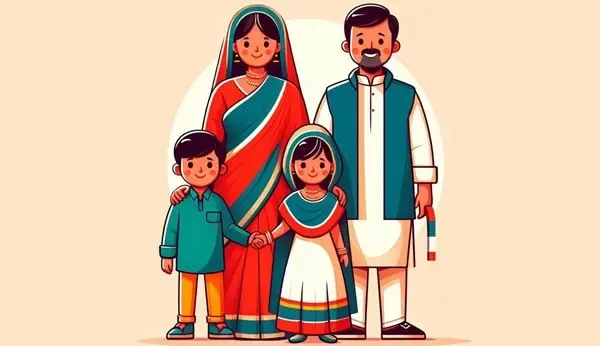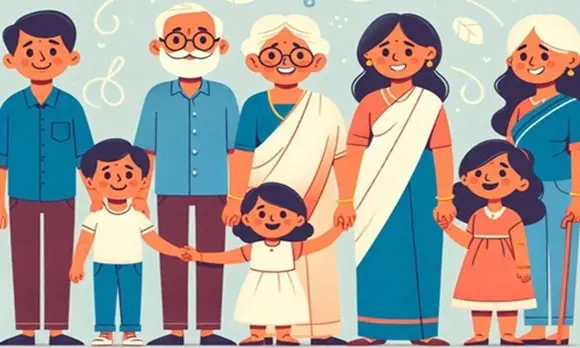Why not get started with the definition of the nuclear family before you get to the actual advantages and disadvantages of the nuclear family? Alright, here we go:
What Do We Mean By A Nuclear Family?
The nuclear family is the one where parents and their children live together under the same roof, with no other extended family members, such as grandparents, aunts, uncles, around. This type of family setup really took off during the Industrial Revolution when people moved to cities for work. As families settled into the cities, they also became more isolated and community-driven compared with the extended-household type of family.
In a nuclear family, the spotlight is on the immediate family unit. You know, parents and kids rely on each other for support and interaction, building close-knit relationships and fostering a strong sense of independence. As a consequence, the family becomes distinct in its own way in the decisions it makes and traditions it develops.
The compelling feature of the nuclear family model is its simplicity: it is organized, disciplined, and straightforward in narrowing the central tasks of the family to what is most essential for parents and children at the expense of the extended family. It offers the nuclear unit the space to get on with it, and probably that is why it works.

Advantages of a Nuclear Family
1. Money Matters
With both parents contributing to the household expenses, nuclear families tend to have more financial stability. In such a family structure, kids have a better chance at success in a setting that is safer and more comfortable. This stability enables the children to participate in such activities as dance, music, or sports, boosting their social and academic growth.
2. Consistent Parenting
A big advantage of the nuclear family is that kids feel the consistency that comes with such a structure, you know? Children thrive when parental rules and expectations are stable, you know, when there’s no worrying about where their parents will be or who’s going to be taking care of them, that’s what we call constant stability. It is what allows kids to do well.
3. Better Education
Nuclear kids, in general, have more opportunities to study, get better learning resources, and more parental support. Why? Well, both parents put education as a high priority and most of the parents in this type of family are educated, therefore they are more likely to push their kids to achieve a higher level of education. Once the children in the nuclear family have more money supply, their parents are more likely to spend money on their kid’s education, such as books, helpers, and tutors.
4. Smooth Communication
And yes, here comes the communication aspect, and you see, the absence of too many relatives makes the nuclear family communicate more easily and effectively. It is easy for members to make choices due to the thoughtlessness of the family, hence making everything easy among them.
5. Shared Duties
In a nuclear family, housekeeping jobs are usually divided between the parents so everyone does not look into it individually, they do every job as a team and as partners which makes every job done faster and efficiently. And yes, it teaches children responsibility and life skills.
6. Freedom to Choose
Nuclear families enjoy a lot of autonomy in decision-making. Couples can set their own routines, traditions, and values without outside interference. All in all, this very autonomy brings a different living experience for the nuclear family, where they have the freedom to decorate their homes according to their own preferences and lifestyles.
Disadvantages of a Nuclear Family
1. Missing Out on Extended Family Love
A major disadvantage of the modern nuclear family is the distance it can put between itself and extended family members. A nuclear family inherently means a narrower support base compared to that of a larger family, and one that might be more necessary than ever when the going gets tough.
2. Juggling Work and Family Life
Handling the double shift of working and parenting for a nuclear family, especially where both parents work full-time, is often very stressful. Work gets in the way of family time, and family time gets in the way of work. In the end, parents get busy and kids feel ignored, and this goes on and on.
3. Harder to Solve Family Fights
From our observations on the subject of nuclear families, ending conflicts is more difficult because there is no elder person who works as an arbitrator and provides important tips and wisdom. If unresolved conflict arises, it can put a strain on the relations and may cause chaos within the household leading to unhappiness.
4. Parent Burnout Alert
You see, parents, especially mums, in nuclear families often experience a form of burnout as they are required to take on the bulk of the family duties without any additional help. Constant work and running around as well as house chores can take a mental, emotional, and physical toll resulting in stress, anxiety, and other mental health problems, which ultimately affect the whole family.
5. Kids Feeling Insecure
And yes, children in a nuclear family would feel insecure and lonely because both parents might be working on their income and they hardly get time for their kids. And yes, when kids in a nuclear family face certain serious problems related to their personal life they will be insecure because they do not have any elder persons to guide them and seek advice from when compared to joint families.
6. Losing Cultural Roots
The move from a joint to a nuclear family may lead to a loss of cultural values and traditions that are traditionally passed down from generation to generation, where the children, or they, themselves are not in regular contact with their extended family. Hence, they will eventually not have the same experiences to be aware of their cultural heritage, nor will it even matter to them.
Quick Comparison Between Advantages and Disadvantages of Nuclear Family
|
Advantages |
Disadvantages |
| Financial Stability | Lack of Extended Family Support |
| Consistent Parenting | Balancing Work and Family is Stressful |
| Better Educational Opportunities | Difficult to Resolve Conflicts |
| Effective Communication | Risk of Parental Burnout |
| Shared Household Responsibilities | Children May Feel Lonely and Insecure |
| Autonomy in Decision-Making | Loss of Cultural Traditions |


